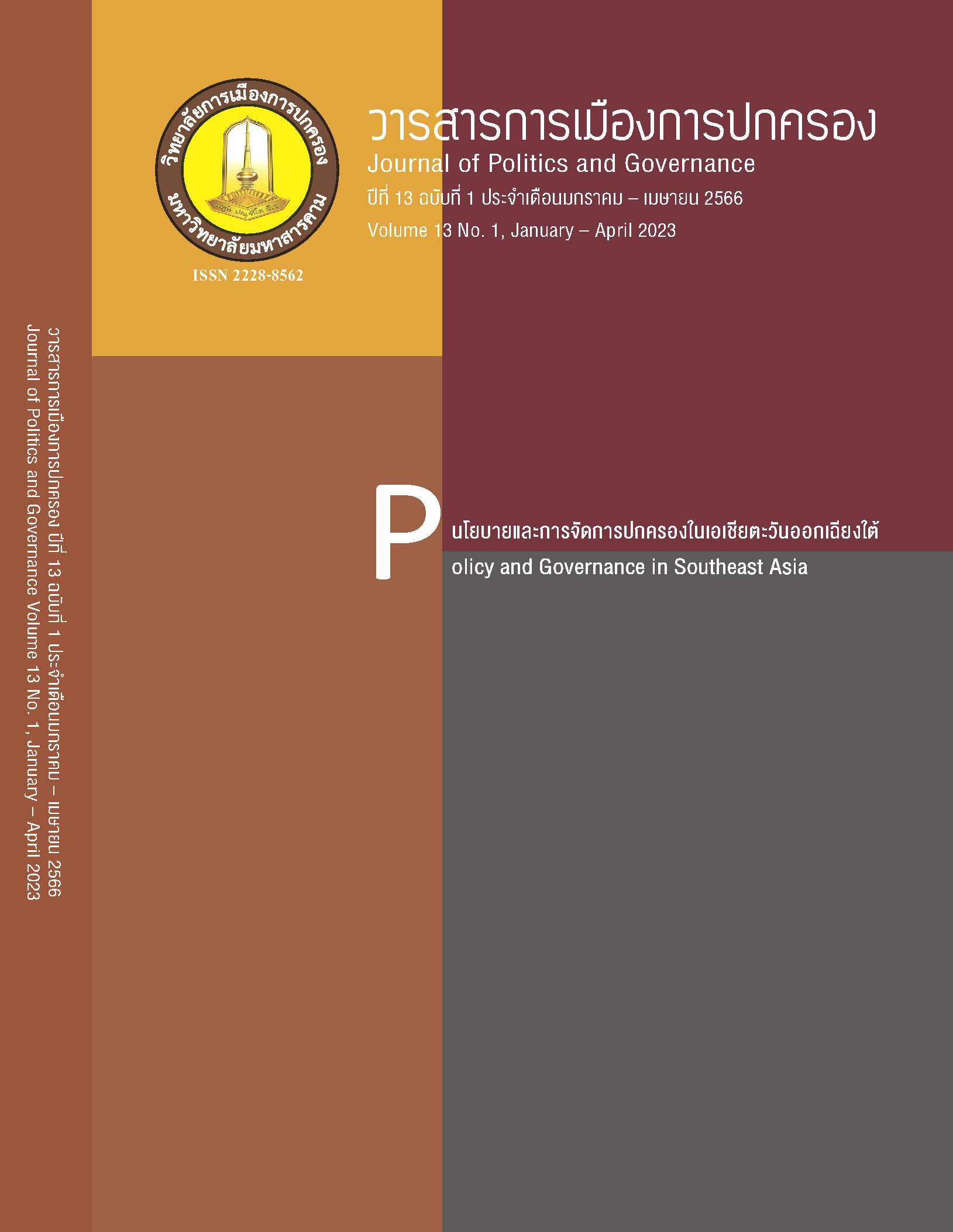The Development of Thailand's Elderly Policy: The Policy Paradigm Shift
Main Article Content
Abstract
This article aims to present the development of Thai elderly policy in the paradigm dimension of the policy. Qualitative research methodology was employed and data were collected from documents, books, research papers, official documents and in-depth interviews. The study revealed that the development of Thailand’s elderly policies is divided into three period. 1) The first is the period of social assistance which was prior to the year 1981. Here, the policy actors believed that the elderly must be taken care of by their families if not the government had to give helps. So, the policy paradigm aimed at giving basic assistance to the elderly who were in difficulties. 2) The second is the period of social service creation which was started from 1982-2002. At this point, the actors had a belief that the elderly deserved good social services. As a result, the main paradigm of the policy was to provide decent social services for the elderly who met designated criteria. 3) The third is the period of rights protection which was ranged from the year 1997-2018. The actors believed that there were both the elderly with powerlessness and those with potential. Nonetheless, these elderly deserved equal social services. Consequently, the main paradigm of the policy was to promote and protect the rights of the elderly, focusing on providing social services to all elderly people according to basic rights. The paradigm shift of Thailand’s elderly policy can be explained as adding and replacing. In the new period, a new paradigm had occurred and replaced the original one. As a result, the original one was altered from the main paradigm to minor paradigm in the newer age. Thailand’s elderly policy, evidently, consists of all three paradigms. Accordingly, policymakers should balance social assistance, social services, and rights protection according to current circumstances.
Article Details
References
คณะอนุกรรมการการศึกษาวิจัยและวางแผนระยะยาวเกี่ยวกับผู้สูงอายุ. (2525). แผนระยะยาว
สำหรับผู้สูงอายุแห่งชาติ พ.ศ. 2525 - 2544. กรุงเทพฯ.
ช.ชยินทร์ เพ็ชญไพศิษฏ์. (2543). แนวทางและมาตรการทางกฎหมายเกี่ยวกับสวัสดิการผู้สูงอายุใน
ประเทศไทย. กรุงเทพ: สถาบันวิจัยระบบสาธารณสุข.
ชวกร ชมภูคำ. (2555). นโยบายสร้างหลักประกันรายได้ผู้สูงอายุกับคุณภาพชีวิตผู้สูงอายุในเขตเทศบาลตำบลบ้านกลาง อำเภอสันป่าตอง จังหวัดเชียงใหม่. (วิทยานิพนธ์รัฐประศาสนศาสตรมหาบัณฑิต). มหาวิทยาลัยเชียงใหม่, เชียงใหม่.
เชาวลักษ์ สุขกันหา. (2553). ปัญหาการนำนโยบายการจ่ายเบี้ยยังชีพผู้สูงอายุไปปฏิบัติ ในองค์การบริหารส่วนตำบลศรีวิลัย อำเภอเสลภูมิ จังหวัดร้อยเอ็ด. (วิทยานิพนธ์รัฐประศาสนศาสตร์มหาบัณฑิต). มหาวิทยาลัยมหาสารคาม, มหาสารคาม.
ณัฐภัทร ถวัลย์โพธิ์และคณะ. (2555). รายงานฉบับสมบูรณ์โครงการศึกษาเปรียบเทียบมาตรการทางกฎหมายเกี่ยวกับ การจัดสวัสดิการและสิ่งอำนวยความสะดวกให้แก่ผู้สูงอายุของไทยและต่างประเทศ เพื่อการปรับปรุงกฎหมายไทย. กรุงเทพ: สำนักงานกองทุนสนับสนุนการสร้างเสริมสุขภาพ.
ปิยากร หวังมหาพร. (2546). นโยบายผู้สูงอายุของประเทศไทย. (วิทยานิพนธ์ปริญญาดุษฎีบัณฑิต). จุฬาลงกรณ์มหาวิทยาลัย, กรุงเทพมหานคร.
พระราชบัญญัติควบคุมการขอทาน พุทธศักราช 2484. (2484, 7 ตุลาคม). ราชกิจจานุเบกษา. เล่มที่ 85 หน้า 1324.
พระราชบัญญัติเบี้ยบำนาญ รศ. 120. (2444, 15 ธันวาคม). ราชกิจจานุเบกษา. เล่ม 18 แผนที่ 37 หน้า 701.
รัตนาภรณ์ ทรงกลด. (2554). การดำเนินงานตามนโยบายสวัสดิการสังคมแก่ผู้สูงอายุในเขตองค์การบริหารส่วนตำบล อำเภอบางเสาธง จังหวัดสมุทรปราการ. (วิทยานิพนธ์รัฐประศาสนศาสตรมหาบัณฑิต). มหาวิทยาลัยขอนแก่น, ขอนแก่น.
วันทนีย์ วาสิกะสิน, สุรางค์รัตน์ วศินารมณ์, และกิติพัฒน์ นนทปัทมะดุล. (2553). ความรู้ทั่วไปเกี่ยวกับสวัสดิการสังคมและสังคมสงเคราะห์ (พิมพ์ครั้งที่ 7). กรุงเทพฯ: สำนักพิมพ์มหาวิทยาลัยธรรมศาสตร์.
สถิตพงศ์ ธนวิริยะกุล. (2556). มโนทัศน์ใหม่ นิยามผู้สูงอายุและการขยายอายุเกษียณ. กรุงเทพฯ: มูลนิธิสถาบันวิจัยและพัฒนาผู้สูงอายุไทย.
สำนักงานสถิติแห่งชาติ. (2561). รายงานการสํารวจประชากรสูงอายุในประเทศไทย พ.ศ. 2560. กรุงเทพฯ: สำนักงานสถิติแห่งชาติ.
อภิญญา เวชยชัย. (2544). การศึกษาโครงการกองทุนส่งเสริมสวัสดิการผู้สูงอายุและครอบครัวในชุมชน “โครงการเบี้ยยังชีพ”. กรุงเทพ: สถาบันวิจัยระบบสาธารณสุข.
Baumgartner, Frank R., and Bryan D. Jones. (1993). Agendas and Instability in American Politics. Chicago: University of Chicago Press.
Hall, P. (1993). Policy Paradigms, Social Learning, and the State: The Case of Economic Policymaking in Britain. Comparative Politics, 25(2), 275–296.
Patton, M.Q. (2002). Qualitative Research and Evaluation Methods. Thousand Oaks, CA: Sage.
True, J.L., Jones, B.D., and Baumgartner, F.R. (2007). Punctuated Equilibrium Theory’ in (ed.) P. Sabatier. Theories of the Policy Process (2 nd Edition). Cambridge MA: Westview Press.


